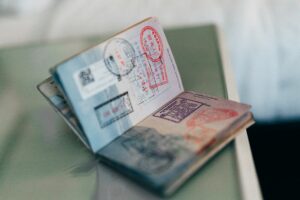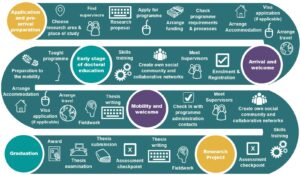Programme information
Similarities and differences across the different countries
Doctoral degree programmes can differ in expectations regarding the research project, thesis format, whether additional training are required, and whether additional examinations are part of the progression requirements each year.
Some research degrees only involve the doctoral candidate pursuing a research project (which could be pre-defined or one that the doctoral candidate has designed), and would involve the support of a supervisor/supervisory team who is an expert researcher in a related discipline.
Other doctoral degrees involve structured PhD programmes, during which you would complete additional training alongside your research project/thesis. This additional training could focus on research methods and skills or could extend your knowledge of a subject to an advanced level.
The structure and expectations of PhD study can be quite different. Undertaking a joint doctoral programme may provide you with the opportunity to undertake a structure different to the standard structure of your home country, or indeed a structure that is a combination of multiple models. You should consider the type of doctoral study that best suits your aspirations as a researcher.

Other differences include but are not limited to:
Admissions criteria
In many countries, admission to doctoral study would require completion of a postgraduate qualification but this is not always the case. You would need to be mindful of the standard admissions requirements for the Universities to which you are seeking to apply.
The length of study
In many European countries and the UK, doctoral study is typically 3 – 4 years in duration, whilst in other countries it could be 5 -7 years or have no minimum or maximum course duration. Your international joint doctorate agreement should specify the duration of study/research project if there is a maximum/minimum period for the completion.
Expectations for teaching
In some countries there may be opportunities to undertake paid teaching positions (supporting teaching on undergraduate and/or postgraduate courses), whilst these opportunities may not exist in others. In some case, it may be an expectation (rather than a paid appointment to a role) or integral to your doctoral student status.
Status
In some countries you will have a student status as a doctoral candidate. However, in some countries you may have dual student and staff status, or solely a staff status. Your international joint doctorate agreement will specify your status at each institution.
Questions to consider when contemplating whether to undertake a joint doctoral programme
Initial arrangements
 Are you applying to an existing joint doctoral programme or are you applying for a doctorate at your home institution and proposing a joint doctoral arrangement with another institution?
Are you applying to an existing joint doctoral programme or are you applying for a doctorate at your home institution and proposing a joint doctoral arrangement with another institution? - What is each partner university providing as part of the joint doctoral programme for example, accommodation, funding, visa advice, research facilities, training, extra-curricular facilities?
- What involvement will you have in the development of any tripartite agreement?
- Where are the policies, rules, and regulations of which you need to be aware, as a doctoral candidate at both institutions?
- Where can you find guidance and information at each institution?
- What are the regulations regarding intellectual property and ownership of your research?
Administrative requirements regarding your admission and registration
 Do you need to register at both partner institutions?
Do you need to register at both partner institutions? - What are the expectations about attendance at each institution?
- Are there any visa requirements to be aware of?
- Is there any funding on offer from the universities involved in the joint doctoral programme?
- What support is on offer for visiting doctoral candidates?
Supervisors
 What are the expectations around supervision?
What are the expectations around supervision? - How frequently would you communicate with your supervisor?
- What is their role in guiding your research project?
- What is their role in supporting your research training?
- Will you have group meetings with supervisors at both institutions (via video link or in person)?
“Be transparent and let all supervisors know about the status of your work. Also, it is important to plan the work in advance, to avoid being surprised by bureaucratic issues (e.g.: missing deadlines or missing requirements to graduate).”
“Make friends in research groups, discuss things with them if not possible to discuss it with the co-supervisor. By exchanging ideas, one would broaden his knowledge and would more efficiently pursue the research instead of being worried about the work. Update your parent university professor about your progress and you will not face any hurdle in your research work.”
Teaching requirements
 Are you expected to teach undergraduate classes as part of your doctoral candidature?
Are you expected to teach undergraduate classes as part of your doctoral candidature? - Is there an opportunity to teach if you want to?
- What training is delivered to doctoral candidates who teach?
- Does the teaching form part of paid employment?
“I wish I [had known] how many hours I should have to teach. Because here I spent a lot of time teaching, and so the balance between teaching and the research is quite hard to find.”
Requirements for progression during your joint PhD
 What are the progression milestones and assessment requirements to proceed each year?
What are the progression milestones and assessment requirements to proceed each year? - Are there specific milestones/objectives that you must meet each year to continue?
- Who evaluates your progress and what are the arrangements for reporting between the partner institutions?
- Is there a single set of rules governing your academic progression and assessment?
Assessment and exam preparation
 What is the structure for the joint doctorate?
What is the structure for the joint doctorate?- What learning, teaching, and skills training are on offer?
- What are the expectations in terms of assessment for the doctorate? Do you have to complete coursework and/or exams, as well as thesis?
- What thesis format options are available to you?
- Are you expected to have a viva as part of your doctoral assessment, and what format will the viva take?
Taught modules

- Are you expected to attend additional training through courses as part of a structured doctoral programme?
- Are you expected to undertake assessment and pass additional training through courses to remain on the doctoral programme?
Training and skills
 What advanced training is on offer to doctoral candidates at each partner university?
What advanced training is on offer to doctoral candidates at each partner university? - How do the universities meet your training needs?
- Will you be encouraged to attend conferences?
- Will you be encouraged to publish your research during your studies?
Other topics
Why choose an international joint PhD?
Choosing your research and places of study
Programme information
How to work succesfully with your supervisors
Practical information for your relocation
Research, skills, and career
Experience of a joint international programme
Contacts
